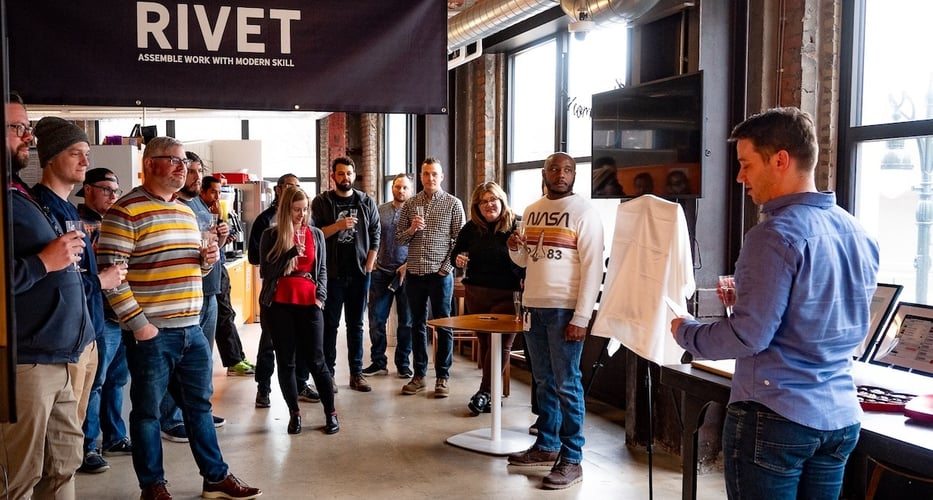In the heart of downtown Detroit, there’s a team of engineers building something that could significantly shift the construction industry — and it’s not another AI tool or B2B CRM. It’s RIVET, a fast-growing startup reimagining how construction contractors manage their workforce — without whiteboards or spreadsheets.
Founded in 2020, RIVET is a workforce management platform built for the construction industry. It helps contractors plan, schedule, and deploy crews more effectively — no small feat in one of the most complex, under-digitized industries.
 “Our biggest competitors are whiteboards and Excel,” said Jason Petterson, a Senior Software Engineer at RIVET. “It’s kind of wild how many massive projects still run that way.”
“Our biggest competitors are whiteboards and Excel,” said Jason Petterson, a Senior Software Engineer at RIVET. “It’s kind of wild how many massive projects still run that way.”
The company’s mission is simple: enable every self-performing contractor to create a Labor Plan that increases productivity and profitability. But the technology behind it is anything but basic.
Bringing Tech to the Trades
At RIVET, innovation drives progress. The software combines everything a contractor needs to manage their workforce: scheduling, dispatch, labor planning, forecasting — all in one place. And while that might sound like table stakes in most industries, in construction, it’s groundbreaking.
 “There are lots of SaaS startups out there, but very few focused on an industry this practical,” said fellow Senior Software Developer Joshua Harshaw. “Every building you step into, every road you drive on — that’s construction. Helping those workers be more efficient helps everyone.”
“There are lots of SaaS startups out there, but very few focused on an industry this practical,” said fellow Senior Software Developer Joshua Harshaw. “Every building you step into, every road you drive on — that’s construction. Helping those workers be more efficient helps everyone.”
That real-world impact was a big reason both engineers decided to join the company. For Josh, it was part of a larger career shift — he had moved from working at companies with more than 2,000 employees to startups with smaller and smaller teams. By the time he joined RIVET, the team had just over 30 people.
“What attracted me was the opportunity to help shape a product that directly supports people doing essential work,” he said. “We’re not just building software for the sake of it. This actually helps people get their jobs done better.”
Jason echoed that sentiment. After working in consulting for big brands like GM and Domino’s, he wanted to get closer to the product side — and closer to a mission that meant something. “My last company built great stuff, but it was always for other clients,” he said. “I wanted to be part of a startup where I could help build something from the ground up, with fun, smart people. RIVET checked all the boxes.”
A Small Team, Building Big Things
RIVET’s engineering team may be small — about 15 people — but they’re tackling some complex challenges. The team is organized into three pods:
- Workforce Scheduling, which focuses on the core app experience;
- Labor Planning, which handles project-level insights and planning tools; and
- Platform & Integrations, which builds the infrastructure that ensures customer data flows smoothly into the system.
Everyone’s trusted to own their work, but support is never far away. “It’s super collaborative,” said Jason. “If someone’s working on a part of the code I know well, I’ll hop on a call and give them a tour. And people do the same for me.”

From bi-weekly retros to impromptu bug squash events (they call it the bug jubilee), the team is constantly learning, iterating, and building — fast. In fact, Josh recently wrapped a project that added single sign-on (SSO) capabilities to the platform, opening the door for enterprise clients with stricter security requirements. “It was one of the most impactful things I’ve worked on,” he said. “It literally unlocked access to a company with 80 different divisions.”
Why Engineers Love Working at RIVET
If you’re the kind of engineer who thrives in ambiguity and likes building from the ground up, RIVET might be your place. There’s no waiting on a six-month planning cycle. If it’s a good idea, you go for it.
“My boss literally said, ‘That’s a great idea — go do it,’” Josh said. “You don’t hear that at larger companies.” And while there’s freedom, there’s also ownership. RIVET engineers are expected to take initiative, wear multiple hats when needed, and make decisions that move the product forward.
“You feel it when your work makes a difference,” said Jason. “That’s what makes it worth it.” It helps that the team is full of people who genuinely want to help each other grow. Whether it’s pair programming or getting on a call to walk through a tricky piece of the codebase, collaboration is baked into the culture.
“We reflect often, hold retros, and really look at how we can improve — not just our code, but the way we work together,” said Josh. “It’s thoughtful. And that’s rare.”
RIVET is proudly based in Detroit and deeply tied to the Midwest startup community. They’re not just building software — they’re building careers, culture, and a company that believes in making construction an industry of choice for the next generation of workers. And it starts with their own team.
“We’re working with incredibly smart people, solving meaningful problems, and growing every day,” Josh said. “What more could you ask for?”
Want to work on hard problems with great people?


.png?width=50&name=Erin%20Gregory%20(1).png)



